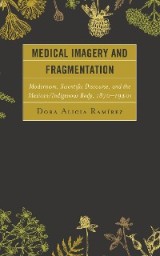Details

Medical Imagery and Fragmentation
Modernism, Scientific Discourse, and the Mexican/Indigenous Body, 1870-1940s|
89,99 € |
|
| Verlag: | Lexington Books |
| Format: | EPUB |
| Veröffentl.: | 19.07.2017 |
| ISBN/EAN: | 9780739198292 |
| Sprache: | englisch |
| Anzahl Seiten: | 112 |
DRM-geschütztes eBook, Sie benötigen z.B. Adobe Digital Editions und eine Adobe ID zum Lesen.
Beschreibungen
<span><span>This Book marks a time period (1870s-1940s) when Mexican authors writing in English saw themselves as transnational authors whose role was to teach the English speaking public about Mexico. This book takes a look at four inspiring women whose ideas represent the way medicine and science permeated the personal lives of Mexican and Indigenous peoples whose lifestyles did not happen to meet the requirements of an industrialized or modern citizenry. These women include historical figures such as the folkloric healer, Teresa Urrea (1873-1906), and authors, Maria Amparo Ruiz de Burton (1872), Maria Cristina Mena (1914), and Josefina Niggli (1947). These women writers focused on the modernist construction of the body and brought in aspects of how the soul (through racial, gendered, national, political, and socio-economic lenses) was reconstructed as a way to manage the health and space of the Mexican/Indigenous populations in order to move into an era of industrialism and positivism. By focusing on how industrialism led to the negation of racialized bodies, knowledges, and spaces, this book takes a deeper look at the concept of the “individual” as a medical, economic, political, and theoretical term, focusing on the way medical knowledge, the doctor, surgery, experimentation, healing, and specifically, the soul, is treated in Latina modernist literature. This book adds to the modernist discussions of literary figures such as Bernard Shaw, T.S. Eliot, D.H. Lawrence, William Carlos Williams, Frida Kahlo, Ezra Pound, and Gertrude Stein. Urrea, Ruiz de Burton, Mena, and Niggli continue the critique of a burgeoning medical system and rhetoric, and they add the Mexican/Indigenous viewpoint and transnational perspective that is important to any dialogue.</span></span>
<span><span>This book </span><span>examines how industrialism led to the negation of racialized bodies, knowledges, and spaces. It analyzes the concept of the “individual” as a medical, economic, political, and theoretical term, focusing on how medical knowledge, doctors, surgery, experimentation, healing, and the soul are treated in Mexican American modernist literature.</span></span>
<span><span>Chapter One - On the Edges of Fragmentation<br>Chapter Two - Entrance into the Soul: The Benevolent Doctor as a Colonizing Agent in Maria Amparo Ruiz de Burton’s Who Would Have Thought It? (1872)<br>Chapter Three – “The Most Dangerous Girl in Mexico”: Medical Rhetoric as Social Order in late 19th Century Mexico and the United States<br>Chapter Four - A Gift from God: Religion and Science in María Cristina Mena’s Short Fiction <br>Chapter Five - Costumbrismo in a Shadowed World: Anxiety in Josefina Niggli’s Step Down, Elder Brother</span></span>
<span><span>Dora Alicia Ramírez is associate professor in the English department at Boise State University. </span></span>
Diese Produkte könnten Sie auch interessieren:

Aspekte der Kinderliteratur. Bilder, Übersetzung und Thematik in der Kinderliteratur

von: GRIN Verlag (Hrsg.), Tabea Götz, Evelyn Abigail Isaak

18,99 €

Inclusion & Exclusion in/au Canada

von: Dagmara Drewniak, Ewelina Feldman-Kolodziejuk, Piotr Sadkowski, Joanna Warmuzinska-Rogóz, Ewelina Berek, Marcin Bzdawka, Grzegorz Dulinski, Krzysztof Majer, Michal Obszynski, Malgorzata Sokolowicz, Tomasz Soroka, Allan Weiss, Anna Zurawska, Anna Branach-Kallas

40,00 €














